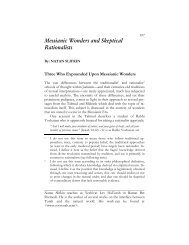Is There a Disconnect between Torah Learning and ... - Hakirah.org
Is There a Disconnect between Torah Learning and ... - Hakirah.org
Is There a Disconnect between Torah Learning and ... - Hakirah.org
You also want an ePaper? Increase the reach of your titles
YUMPU automatically turns print PDFs into web optimized ePapers that Google loves.
18 : Hạkirah, the Flatbush Journal of Jewish Law <strong>and</strong> Thought<br />
For example, people who had to control themselves by not eating<br />
from a plate of delicious cookies placed in front of them were less<br />
capable of exercising self-control on a totally unrelated task. They<br />
could not concentrate on a set of insoluble anagrams for nearly as long<br />
as people who had not had to control themselves by not eating the<br />
cookies. The need for self-control is not confined to diets <strong>and</strong> the like.<br />
Self-control affects a broad range of our daily behaviors; concentrating<br />
on work or on a lesson requires us to exercise self-control (to make<br />
sure we are not distracted), sitting in a classroom <strong>and</strong> holding ourselves<br />
back from talking to a neighbor requires self-control, <strong>and</strong> of course,<br />
maintaining civility in the face of provocation requires great selfcontrol.<br />
Would I be totally off the mark if I were to suggest that one<br />
reason for the lapses in civil behavior (middos) of yeshiva <strong>and</strong> day<br />
school children is that they are quite simply tuckered out from<br />
exercising self-control all day in school? That they are “collapsing<br />
under the load”? They sit in school, under conditions requiring<br />
disciplined self-control <strong>and</strong> concentration, for long hours (in the case<br />
of many boys, for longer than their parents sit at their desks at work).<br />
They have limited outlets for their natural energy, which they must<br />
hold in check all day. <strong>Is</strong> it possible that rabbeyim recognize this <strong>and</strong><br />
feel that after all the boys need to do, asking them to exercise selfcontrol<br />
in how they talk to their siblings, their parents, <strong>and</strong> others<br />
would be a case of מרובה לא תפסת ?תפסת <strong>Is</strong> it possible that because<br />
they feel that “something has to give,” mechanchim make a conscious<br />
decision to let middos education slide? If so, are we not akin to the<br />
who properly locks a sheep in a corral, but under a hot burning שומר<br />
sun? The שומר is then held responsible when the sheep breaks out<br />
<strong>and</strong> runs away. 11 More important, if this is the choice mechanchim feel<br />
they have been forced to make, is it the right choice? I believe it is<br />
not.<br />
I believe that we have f<strong>org</strong>otten or confused our priorities as<br />
outlined in Shulchan Aruch. We tend to come down hard on children<br />
when they lapse in מצוות בין אדם למקום but are more accepting <strong>and</strong><br />
tolerant when they lapse in בין אדם לחבירו .מצוות The Shulchan Aruch,<br />
"ה בבא קמא נ haKones: 11 See Mishnah <strong>and</strong> Gemara at the beginning of Perek<br />
.ע"ב ורש" י שם
















